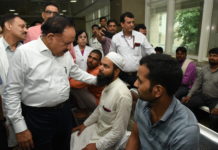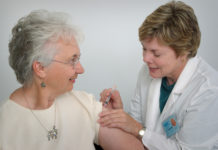
March is colorectal cancer awareness month. Colonoscopy is the most effective preventive tool to detect precancerous colonic polyps
More than 90% of cases of colorectal cancer occur in people who are above 50 years of age. Screening for this cancer is key because early detection and removal of colon polyps during a colonoscopy can prevent it. Colon polyps are mostly benign growths in the colon that start from normal colon tissue, but can grow larger and become precancerous.
Medibulletin takes you through the disease. March is observed as Colorectal Cancer Awareness Month.
What is colon polyp and how does it become cancerous?
Colon polyp is the abnormal growth of tissues found in the inner wall of the large intestine, also called colon. The growth may rise from either layer of muscles – mucosal layer or submucosal layer.
Eventually they may regress or grow further to become pre-cancerous and then malignancy or cancer develops. The malignant version is called colorectal cancer and they can occur in any part of the colon.
Colonoscopy is the standard procedure used in identifying polyps and colon cancer masses in the large intestine through a fiber-optic tube. Other recommended modalities include computed tomography colonography (CTC), barium enema and flexible sigmoidoscopy.
What are the common symptoms of colorectal cancer?
Most often, there are no symptoms when a person has polyps in his/her colon. The lack of symptoms is an important reason for everyone to be screened for colon cancer at the recommended age of 50 for those who are not at high risk.
In India, colorectal cancer is the fourth leading cause of death in men and third in women. However, compared to the Western countries, colorectal cancer incidence rates are much lower in India.
Most symptoms develop at advanced stages of colorectal cancer. These include blood in stools, change in bowel habits such as diarrhoea or constipation, abdominal or rectal pain, unexplained low hemoglobin especially in men, frequent urge to have bowel movements, feeling of incomplete defecation and sudden significant weight loss.
What are the risk factors associated with colorectal cancer?
Risk of getting colorectal cancer increases as one gets older (more than 90% of cases occur in people who are above 50 years of age). Genetic syndromes such as familial adenomatous polyposis (FAP) or hereditary non-polyposis colorectal cancer (Lynch syndrome) are associated with increased risk of colorectal cancer at an early age. Other risk factors include smoking, chronic alcohol intake, inflammatory bowel disease such as crohn’s disease or ulcerative colitis and a family history of colorectal cancer or colorectal polyps.
In India, colorectal cancer is the fourth leading cause of death in men and third in women. However, compared to the Western countries, colorectal cancer incidence rates are much lower in India.













